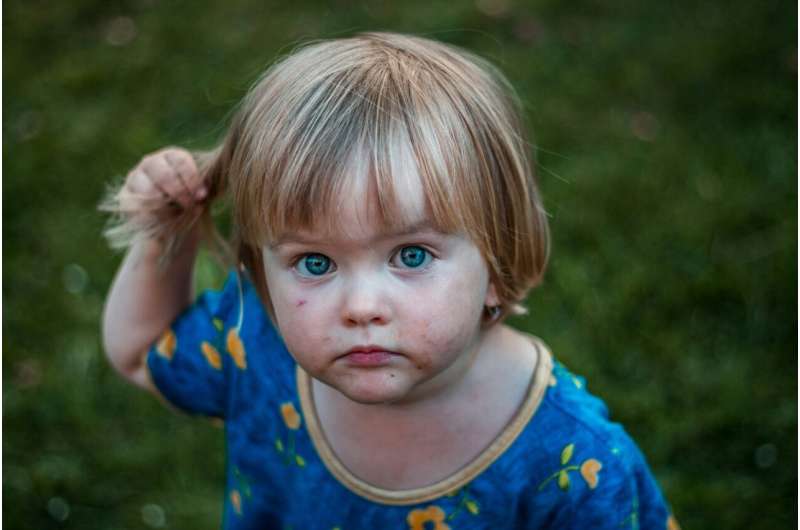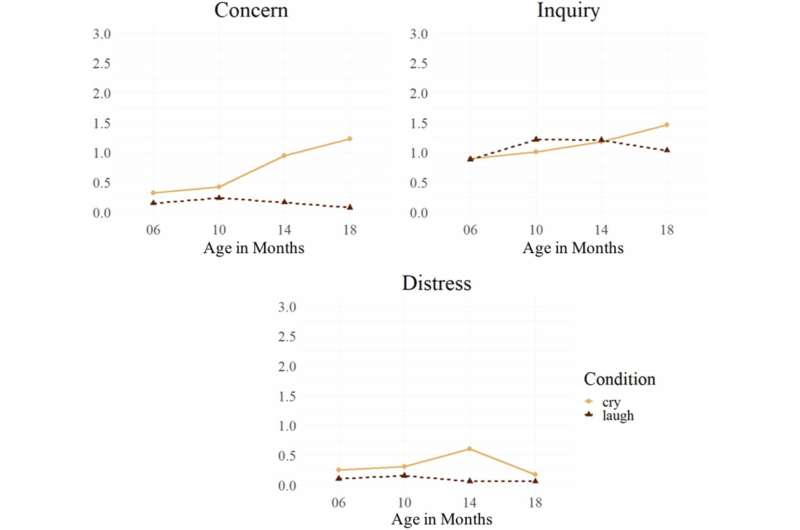This article has been reviewed according to Science X's editorial process and policies. Editors have highlighted the following attributes while ensuring the content's credibility:
fact-checked
trusted source
proofread
Psychologists determine concern for others emerges during second year of life

Children have been shown to already exhibit empathic concern at 18 months. In an LMU study published in Cognitive Development, the facial expressions, gestures, or vocalizations of children at this age indicated they were emotionally affected by the distress of another person.
From a psychological standpoint, this is an important developmental step. "To experience empathic concern, the child must be able to distinguish between the self and the other person," says Markus Paulus, chair of developmental psychology and educational psychology at LMU. This self-concept emerges during the second year of life, as evidenced for instance by children recognizing themselves in the mirror.
Infants are moved by the feelings of others, such as fear or grief, from an early age. Developmental psychology interprets this emotional contagion as a first step toward empathic concern. "For empathic concern, you also have to be able to regulate the emotion and not be overwhelmed by it," explains Paulus. Empathic concern requires not only affective resonance, but also cognitive understanding and the ability to take the perspective of the other person.
In the study, the researchers also investigated what role the behavior of caregivers plays in the ability of children to feel empathic concern for others. They discovered that the degree of parental sensitivity is key: The more sensitively mothers responded to the needs of their infants, the greater the capacity of the children was in their second year of life to show empathic concern for a stranger. Thus, empathic concern is socially acquired.

"A child couldn't survive without sensitive caregivers who act with empathic concern. Children learn from them how to deal with negative emotions. As a result, they are subsequently able to apply these lessons themselves," says Paulus. As such, the study shows that empathic concern is not innate, but develops in the context of social interactions.
For the further development of the child, empathic concern is critical for prosocial behavior. "Empathic concern helps us respond appropriately to the distress of others. It motivates us to care for them," says co-author Tamara Becher.
For the study, a team led by Paulus and Becher invited the same infants and their mothers to behavioral experiments at LMU when the children were 6, 10, 14 and 18 months old. A total of 127 mother–child pairs were studied over a period of one-and-a-half years. The researchers recorded signs of empathic concern in the children in playful situations at four different points in time.
In the experiment, the children observed how another person had a slight accident and simulated pain. Their response was additionally compared against their behavior when they saw another person laughing. The children were 6 months old at the time of their first visit and 18 months old at the time of their last one.
More information: Markus Paulus et al, When do children begin to care for others? The ontogenetic growth of empathic concern across the first two years of life, Cognitive Development (2024). DOI: 10.1016/j.cogdev.2024.101439



















